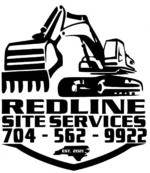Sustainable land clearing protects soil health, water quality, and crop yields for Marshville farms. Unlike traditional methods, eco-friendly practices reduce erosion and comply with Union County environmental laws. This guide explains practical strategies tailored to agricultural land in Marshville.
What is Sustainable Land Clearing?
Sustainable land clearing removes vegetation while preserving soil structure and local ecosystems. Methods prioritize minimal disruption to natural habitats and water sources. In Marshville, farms must follow NC Department of Agriculture (NCDA) guidelines to avoid penalties.
Key benefits:
- Maintains soil nutrients for higher crop yields.
- Reduces sediment runoff into nearby streams.
- Lowers long-term costs by preventing erosion damage.
For compliant land clearing & erosion control, call (704) 562-9922.
Top Sustainable Land Clearing Techniques for Marshville Farms
1. Mulching and Biomass Recycling
Mulching involves grinding trees and brush into nutrient-rich mulch. This method avoids burning, which releases carbon and harms air quality.
Data:
- Mulching improves soil moisture retention by 20–30%.
- Reduces land clearing costs by 500–500–1,000 per acre compared to hauling debris.
Best for: Small to mid-sized farms with light vegetation.
2. Controlled Burns
Controlled burns remove invasive plants while recycling nutrients into the soil. Marshville requires a Burn Permit from the NC Forest Service for fires larger than 1 acre.
Safety rules:
- Burn only on days with humidity above 30% and wind under 10 mph.
- Create firebreaks 10 feet wide around the burn area.
Professional grading services can prepare firebreaks and level terrain post-burn.
3. Low-Impact Machinery
Using machinery with wide tires or tracks reduces soil compaction. Compacted soil can cut crop yields by 15–20%.
Equipment examples:
- Skid-steers with rubber tracks.
- Mulchers with adjustable cutting heights.
4. Selective Clearing
Remove only necessary trees and shrubs, leaving native plants in drainage areas. This protects pollinators and prevents erosion.
Example: A Marshville soybean farm increased yields by 12% after switching to selective clearing.
How to Plan Sustainable Land Clearing
1. Conduct a Soil Health Test
Test soil for pH, nutrients, and organic matter. Marshville’s acidic soils often need lime applications costing 50–50–100 per acre.
Tools:
- Soil testing kits from the NC Cooperative Extension.
- Drone mapping to identify erosion-prone zones.
2. Designate Buffer Zones
Leave 30–50 foot buffers near streams, wetlands, or wildlife habitats. The Clean Water Act fines violations up to $37,500 per day.
Buffer plants for Marshville:
- Switchgrass (reduces runoff by 60%).
- Black willow trees (stabilizes soil).
3. Schedule Clearing During Dry Seasons
Late summer and early fall have lower rain rates, minimizing erosion. Marshville averages 4.2 inches of rain in October vs. 6.5 inches in April.
Cost Comparison: Traditional vs. Sustainable Methods
| Method | Cost per Acre | Erosion Reduction | Soil Health Impact |
|---|---|---|---|
| Bulldozing | $1,200–$2,500 | 10–20% | High compaction |
| Mulching | $800–$1,800 | 70–80% | Improves nutrients |
| Controlled Burns | $300–$600 | 40–50% | Neutral |
| Selective Clearing | $1,000–$1,500 | 60–70% | Positive |
Septic tank services may be needed if clearing near livestock wastewater systems.
Common Mistakes to Avoid
1. Over-Clearing Sloped Land
Clearing more than 30% of slopes increases erosion by 50%. Use terracing or contour plowing instead.
2. Ignoring Invasive Species
Invasive plants like kudzu can regrow quickly. Herbicide-free removal methods cost 200–200–400 per acre.
3. Skipping Post-Clearing Soil Care
Apply compost or cover crops to restore nutrients. Bare soil loses 5–10 tons of topsoil per acre annually.
FAQs About Sustainable Land Clearing
Q: Do I need a permit to clear invasive species?
A: No, but you must follow NCDA guidelines for disposal to prevent regrowth.
Q: Can I reuse cleared wood?
A: Yes. Selling timber offsets 20–30% of clearing costs (NC Forest Service).
Q: How long does sustainable clearing take?
A: Methods like mulching take 2–3 days per acre vs. 1 day for bulldozing.
Call Us Today
Upgrade your farm’s land management with eco-friendly practices. Call (704) 562-9922 for land clearing & erosion control in Marshville.
Sources:
